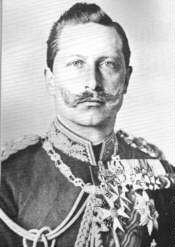In addition to the thread about WWI, here is the thread with short biographies of the most important leaders: I'll start with Tzar Nicolay II:
Emperor Nicolay II : Russia
Nicholas II was born on May 6, 1868, in Tsarskoe Selo. He was delivered by his mother Marie Fyodorovna Romanova, formerly Dagmar, Princess of Denmark. His father Alexander Romanov was an important member of the Russian government.
Unlike the rest of the Romanov men, Nicholas was not a very big man. The other men were always very intimidating; Nicholas however, was a mere 5' 6 tall. To make up for his lack of height, Nicholas worked out with weights and other various athletic equipment.
Nicholas was known for his regal appearance. He had lively blue eyes that people always thought were the well of his soul. He wore his brown hair parted to the left and had a thick beard. He had golden highlights throughout. Those golden highlights stayed with him throughout his life and became his signature feature.
Nicholas had a nervous habit of always brushing his thick mustache with the back of his hand. Nicholas inherited a pug nose from his father. He disliked it very much because it reminded him of Paul I whom he considered the most unattractive of his relatives.
Nicholas was an extremely smart man and very well educated. He was at the top of his class and was the most intelligent of the European monarchs of his time. His parents prepared him for the task of being a 20th Century Czar, knowing it would be quite different from previous years.
The family was guarded by secret police and military guards. This meant that Nicholas grew up in almost complete seclusion from the outside world. This was not helpful to his maturing process or understanding of the ways in which his future subjects lived. Because he was so secluded, Nicholas never grew an appreciation for how people lived, and his ideas about important issues were very narrow-minded. His immaturity and lack of understanding would hinder his ability to govern Russia in the future.
While heir to the throne, Nicholas worked his way into the rank of Colonel in the Life Guards. He had a love for the military and always considered himself an army man. His personality and social habits were greatly influenced by his years as a young officer. He made many of his longest lasting friendships among his fellow officers. These were the happiest years when he had no worries of his future reign as Czar of Russia.
Nicholas gave his heart to a young, German princess named Alex of Hess. It was thought that they were not a good match. She was not seen as the type of woman with the strong qualities needed in an Empress to be. Yet, they were formally engaged in 1893.
Nicholas felt he was not up to the task of ruling Russia. He felt as though he had not the abilities or the experience. Yet, he took his coronation oath very seriously. Realizing that he was surrounded by bureaucrats, he quickly figured out he could trust few people. He turned to his wife, knowing that she was the one true person that he could rely on for support. Loneliness became his way of life.
Nicholas always put his country before anything else in life. He thought the fate of his family and his country were inseparable. He knew the shortcomings of his family dynasty all too well. Only he could keep it from falling apart. Being a very smart man, he realized he was a target for assassination. His wife's love and devotion were cherished throughout his life.
Though praised for his admirable qualities, he was portrayed as a failure. It was very hard for him to distinguish his own views of what was right and wrong for Russia. Although he was not an unintelligent man, he was hesitant to draw his own conclusions. He often pondered on important issues. Lacking political knowledge and instinct, he was rarely sure how to handle the affairs of state. He was thought of as weak and very contradictorious. It was difficult to relate to his mentality and follow his leadership.
In 1914, World War I began. Nicholas II took command of the army in 1915. He left the government of Russia in the hands of Czarina Alexandra Feodorovna and her advisor Rasputin. Discontent spread throughout Russia. The army was tired of war, and food shortages worsened. The government was in complete disarray. In March of 1917, Nicholas II was forced to abdicate. He and his family were shot to death in Yekatinburg on July 16, 1918.




 Reply With Quote
Reply With Quote


Bookmarks